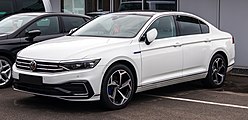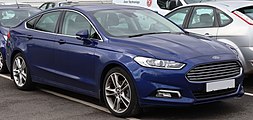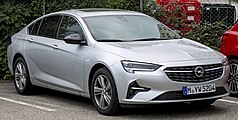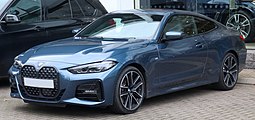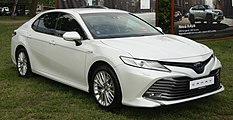D-segment
The D-segment is the 4th category of the European segments for passenger cars, and is described as "large cars".[1][2]
It is equivalent to the Euro NCAP "large family car" size class,[3] and the present-day definition of the mid-size car category used in North America.[4][5] Compact executive cars are part of the D-segment size category.
D-segment sales represent approx. 7% of the market in 2010s. [6] [7]
Characteristics
Most D-segment cars are sedans/saloons or wagons/estates but hatchbacks, and coupes have been common.
Pricing and specification of D-segment cars can vary greatly, from basic low-cost transport to more luxurious and expensive models.
Current models
In 2020 the fifteen highest selling D-segment cars in Europe were the BMW 3 Series, Volkswagen Passat, Tesla Model 3, Mercedes-Benz C-Class, Audi A4/S4/RS4, Škoda Superb, Volvo S60/V60, Peugeot 508, Audi A5/S5/RS5, Ford Mondeo, Opel/Vauxhall Insignia, BMW 4 Series, Volkswagen Arteon, Toyota Camry and Polestar 2. [8]
100.000 – 200.000 sales (Best-Selling)
-
BMW 3 Series
7th generation (2018–present) -
Volkswagen Passat
8th generation (2015–present)
50.000 – 100.000 sales
-
Mercedes-Benz C-Class
5th generation (2021–present) -
Audi A4
5th generation (2016-present) -
Skoda Superb
3rd generation (2015-present) -
Volvo S60
3rd generation (2019-present)
10.000 – 50.000 sales
-
Peugeot 508
2nd generation (2018-present) -
Audi A5
2nd generation (2016–present) -
Ford Mondeo
4th generation (2014–present) -
Opel/Vauxhall Insignia
2nd generation (2017–present) -
BMW 4 Series
2nd generation (2020–present) -
Volkswagen Arteon
1st generation (2017–present)
Less than 10.000 sales
-
Toyota Camry
8th generation (2017–present)
Sales figures in Europe
| 2020 rank |
Brand | Model | 2014 | 2015 | 2016 | 2017 | 2018 | 2019 | 2020 | % change (2019–2020) | ||
|---|---|---|---|---|---|---|---|---|---|---|---|---|
| 1 | BMW | 3 Series | 168,275 | 143,023 | 144,561 | 129,053 | 106,991 | 124,537 | 118,369 | |||
| 2 | Volkswagen | Passat | 153,677 | 226,127 | 206,813 | 183,288 | 154,074 | 124,650 | 115,363 | |||
| 3 | Tesla | Model 3 | – | – | – | – | 95,168 | 85,979 | ||||
| 4 | Mercedes-Benz | C-Class | 136,474 | 173,011 | 176,038 | 176,915 | 150,995 | 143,293 | 81,909 | |||
| 5 | Audi | A4/S4/RS4 | 124,170 | 124,466 | 162,655 | 146,006 | 112,484 | 102,994 | 77,515 | |||
| 6 | Škoda | Superb | 46,149 | 50,533 | 85,879 | 81,410 | 74,697 | 67,488 | 59,925 | |||
| 7 | Volvo | S60/V60 | 54,663 | 54,354 | 53,268 | 45,335 | 46,945 | 65,917 | 58,003 | |||
| 8 | Peugeot | 508 | 41,797 | 43,301 | 37,104 | 22,842 | 13,378 | 41,329 | 29,011 | |||
| 9 | Audi | A5/S5/RS5 | 47,591 | 45,202 | 43,686 | 61,619 | 49,799 | 41,812 | 28,525 | |||
| 10 | Ford | Mondeo | 45,405 | 79,673 | 70,900 | 56,173 | 49,596 | 39,555 | 21,222 | |||
| 11 | Opel/Vauxhall | Insignia | 92,694 | 88,544 | 73,161 | 72,347 | 67,424 | 45,925 | 21,133 | |||
| 12 | BMW | 4 Series | 53,948 | 72,769 | 67,983 | 64,710 | 52,248 | 35,908 | 18,139 | |||
| 13 | Volkswagen | Arteon | – | – | 0 | 9,798 | 21,495 | 19,048 | 13,582 | |||
| 14 | Toyota | Camry | – | – | – | – | 0 | 7,640 | 9,119 | |||
| 15 | Polestar | Polestar 2 | – | – | – | – | – | 0 | 8,746 | New | ||
| 16 | Renault | Talisman | – | 1,824 | 34,344 | 32,163 | 19,784 | 16,405 | 8,025 | |||
| 17 | Alfa Romeo | Giulia | – | 0 | 10,475 | 24,679 | 17,075 | 10,932 | 7,436 | |||
| 18 | Mazda | Mazda6 | 31,032 | 30,519 | 29,226 | 23,090 | 23,090 | 22,048 | 6,950 | |||
| 19 | Kia | Optima | 3,409 | 3,263 | 9,515 | 16,152 | 14,404 | 12,202 | 6,086 | |||
| 20 | Subaru | Legacy/Outback | 6,415 | 10,806 | 8,242 | 7,016 | 7,460 | 7,504 | 3,844 | |||
| 21 | Jaguar | XE | 0 | 16,535 | 24,461 | 18,999 | 10,877 | 7,978 | 3,780 | |||
| 22 | Lexus | IS | 9,610 | 7,729 | 6,234 | 5,649 | 5,413 | 3,282 | 1,855 | |||
| 23 | Kia | Stinger | – | – | 0 | 1,143 | 3,820 | 3,600 | 1,387 | |||
| 24 | Subaru | Levorg | – | 2,437 | 4,689 | 2,865 | 1,748 | 1,395 | 825 | |||
| 25 | Lexus | RC | 30 | 526 | 1,815 | 1,390 | 1,334 | 1,082 | 710 | |||
| 26 | Hyundai | i40 | 25,016 | 25,045 | 20,253 | 15,251 | 9,144 | 3,445 | 305 | |||
| 27 | Infiniti | Q50 | 2,426 | 3,020 | 2,698 | 1,777 | 1,471 | 563 | 71 | |||
| 28 | Infiniti | Q60 | 99 | 507 | 368 | 83 | 1 | – | ||||
| Mainstream | 527,783 | 619,474 | 625,185 | 542,947 | 450,035 | - | - | |||||
| Premium | 613,234 | 662,738 | 709,754 | 694,030 | 584,091 | - | - | |||||
| Segment total | 1,046,829 | 787,815 | ||||||||||
| Source | [9][10] | [11][12] | [13][14] | [15][16] | [17][18] | [19] | [20] |
Notes:
Jump in segment total sales after 2019. year is because premium cars are included.
From 2014-2018 premium cars are not included in total segment sales.
Premium brands and models are marked italic.
Electric cars are included in D-segment from 2019. year.
2019 - After years of decline, the midsized car segment is actually up 1% in 2019 to 1.05 million sales, maintaining a 6.7% share of the overall car market. [21]
2020 - The midsized car segment is down 25% in 2020 to just under 790,000 sales, as its share of the European car market drops to 6.6%, slightly down from 6.7% last year. And luxury brands have now officially taken over control of this class, improving their share to 62.3% from 60.5% last year and claiming four of the top-5 positions. The top-3 players all gain share, outperforming not only the class but also the overall market. [22]
Historic models
Note: this list includes cars from these decades which carried a different nameplate or numeric designation to the modern day equivalent, and in some cases there is no modern day direct equivalent
1960s
- (1960) Peugeot 404
- (1961) Fiat 1300
- (1962) Ford Cortina
- (1962) Alfa Romeo Giulia
- (1963) Lancia Fulvia
- (1964) Austin/Morris 1800
- (1964) Ford Mustang
- (1964) Pontiac GTO
- (1965) Renault 16
- (1966) BMW 02 Series
- (1966) Chevrolet Camaro
- (1966) Hillman Hunter
- (1967) Fiat 125
- (1968) Peugeot 504
- (1969) Renault 12
1970s
- (1970) Opel Ascona (A)
- (1970) Volkswagen K70
- (1974) Fiat 132
- (1972) Alfa Romeo Alfetta
- (1972) Audi 80
- (1972) Lancia Beta
- (1972) Toyota Carina
- (1973) Volkswagen Passat
- (1974) Volvo 200 Series
- (1975) BMW 3 Series (E21)
- (1975) Leyland Princess
- (1975) Opel Ascona (B) / Vauxhall Cavalier
- (1976) Honda Accord
- (1978) Audi 80
- (1978) Peugeot 305
- (1978) Renault 18
- (1978) Saab 900
1980s
- (1981) Volkswagen Passat (B2)
- (1981) Fiat Argenta
- (1982) BMW 3 Series (E30)
- (1982) Citroën BX
- (1982) Ford Sierra
- (1982) Mercedes-Benz 190E
- (1982) Nissan Stanza
- (1984) Austin Montego
- (1984) Hyundai Stellar
- (1985) Alfa Romeo 75
- (1985) Fiat Croma
- (1986) Renault 21
- (1987) Peugeot 405
- (1988) Audi 80 B3
- (1988) Opel Vectra/Vauxhall Cavalier
- (1988) Volkswagen Passat B3
- (1989) Hyundai Sonata
1990s
- (1990) BMW 3 Series (E36)
- (1990) Nissan Primera
- (1991) Audi 80 B4
- (1991) Volvo 850
- (1992) Alfa Romeo 155
- (1992) Ford Mondeo
- (1993) Citroën Xantia
- (1993) Renault Laguna
- (1993) Rover 600 Series
- (1993) Volkswagen_Passat_(B4)
- (1994) Mercedes-Benz C-Class (W202)
- (1994) Saab 900
- (1995) Opel/Vauxhall Vectra
- (1995) Peugeot 406
- (1996) Audi A4 B5
- (1997) Alfa Romeo 156
- (1997) Volkswagen Passat (B5)
- (1997) Volvo S70
- (1998) BMW 3 Series (E46)
- (1998) Saab 9-3
- (1998) Toyota Avensis
- (1999) Kia Clarus
- (1999) Lancia Lybra
- (1999) Lexus IS
2000s
- (2000) Ford Mondeo
- (2000) Volvo S60
- (2001) Audi A4 B6
- (2001) Citroën C5
- (2001) Mercedes-Benz C-Class (W203)
- (2001) Renault Laguna II
- (2001) Škoda Superb
- (2002) Jaguar X-Type
- (2002) Opel/Vauxhall Vectra
- (2003) Acura TSX
- (2003) Infiniti G25/35
- (2003) Saab 9-3
- (2004) Acura TL
- (2004) Peugeot 407
- (2005) Alfa Romeo 159
- (2005) BMW 3 Series (E90)
- (2005) Fiat Croma
- (2005) Renault Samsung SM5 II
- (2006) Audi A4 B7
- (2006) Cadillac BLS
- (2006) Lexus IS (XE20)
- (2006) Lincoln Zephyr/MKZ
- (2006) Volkswagen Passat (B6)
- (2007) Renault Laguna III
- (2008) Acura TSX
- (2008) Audi A5 8T/8F
- (2008) Citroën C5
- (2008) Ford Mondeo
- (2008) Infiniti G37
- (2008) Mercedes-Benz C-Class (W204)
- (2008) Škoda Superb
- (2008) Volkswagen CC
- (2009) Audi A4 B8
- (2009) Acura TL
- (2009) Lexus HS
- (2009) Opel/Vauxhall Insignia/Buick Regal
- (2009) Renault Samsung SM5 III
- (2009) Seat Exeo
2010s
- (2010) Peugeot 508
- (2011) DS 5
- (2011) Hyundai i40
- (2011) Volkswagen Passat (B7)
- (2011) Volvo S60
- (2012) BMW 3 Series (F30)
- (2013) BMW 4 Series (F32)
- (2013) Cadillac ATS
- (2014) DS 5LS
- (2014) Ford Mondeo/Fusion
- (2014) Infiniti Q50
- (2014) Lexus IS (XE30)
- (2014) Lincoln MKZ
- (2015) Acura TLX
- (2015) Mercedes-Benz C-Class (W205)
- (2015) Renault Talisman
- (2015) Volkswagen Passat (B8)
- (2016) Alfa Romeo Giulia (952)
- (2016) Audi A4 B9
- (2016) Audi A5 8W6
- (2016) Jaguar XE
- (2016) Škoda Superb III
- (2017) Opel/Vauxhall Insignia/Buick Regal
- (2018) Genesis G70
- (2018) Kia Stinger
- (2018) Volkswagen Arteon
- (2019) BMW 3 Series (G20)
- (2019) BMW 4 Series (G22)
- (2019) Volvo S60
2020s
- (2020) Cadillac CT4
- (2021) DS 9
- (2022) Mercedes-Benz C-Class (W206)
See also
References
- ^ "Regulation (EEC) No 4064/89 - Merger Procedure" (PDF). www.europa.eu.
exact market definition was left open .. boundaries between segments are blurred by factors other than the size or length of cars
- ^ "Impact on the Competitiveness of the European Automotive Industry of Potential FTA with India and ASEAN" (PDF). www.europa.eu. p. 8. Archived from the original (PDF) on 29 April 2013.
- ^ "Latest Safety Ratings". www.euroncap.com. Retrieved 8 January 2019.
- ^ "2019 Nissan Altima Proves Midsize Sedans Aren't Dead Yet". www.wardsauto.com. 8 October 2018. Retrieved 26 January 2019.
- ^ "America's D-Segment Flab". www.thetruthaboutcars.com. 9 October 2008. Retrieved 26 January 2019.
- ^ "European sales 2019 Midsized cars". www.carsalesbase.com. March 2021. Retrieved 21 March 2021.
- ^ "European sales 2020 Midsized cars". www.carsalesbase.com. March 2021. Retrieved 21 March 2021.
- ^ "European sales 2020 Midsized cars". www.carsalesbase.com. March 2021. Retrieved 21 March 2021.
- ^ "European sales 2014 Midsize segment". www.carsalesbase.com. March 2021. Retrieved 21 March 2021.
- ^ "European sales 2014 Premium Midsize segment". www.carsalesbase.com. March 2021. Retrieved 21 March 2021.
- ^ "European sales 2015 Midsize segment". www.carsalesbase.com. March 2021. Retrieved 21 March 2021.
- ^ "European sales 2015 Premium Midsize segment". www.carsalesbase.com. March 2021. Retrieved 21 March 2021.
- ^ "European sales 2016 Midsized car segment". www.carsalesbase.com. March 2021. Retrieved 21 March 2021.
- ^ "European sales 2016 Premium Midsize segment". www.carsalesbase.com. March 2021. Retrieved 21 March 2021.
- ^ "European sales 2017 Midsized car segment". www.carsalesbase.com. March 2021. Retrieved 21 March 2021.
- ^ "European sales 2017 Premium Midsize segment". www.carsalesbase.com. March 2021. Retrieved 21 March 2021.
- ^ "European sales 2018 Midsized car segment". www.carsalesbase.com. March 2021. Retrieved 21 March 2021.
- ^ "European sales 2018 Premium Midsize segment". www.carsalesbase.com. March 2021. Retrieved 21 March 2021.
- ^ "European sales 2019 Midsized cars". www.carsalesbase.com. March 2021. Retrieved 21 March 2021.
- ^ "European sales 2020 Midsized cars". www.carsalesbase.com. March 2021. Retrieved 21 March 2021.
- ^ "European sales 2019 Midsized cars". www.carsalesbase.com. March 2021. Retrieved 21 March 2021.
- ^ "European sales 2020 Midsized cars". www.carsalesbase.com. March 2021. Retrieved 21 March 2021.





